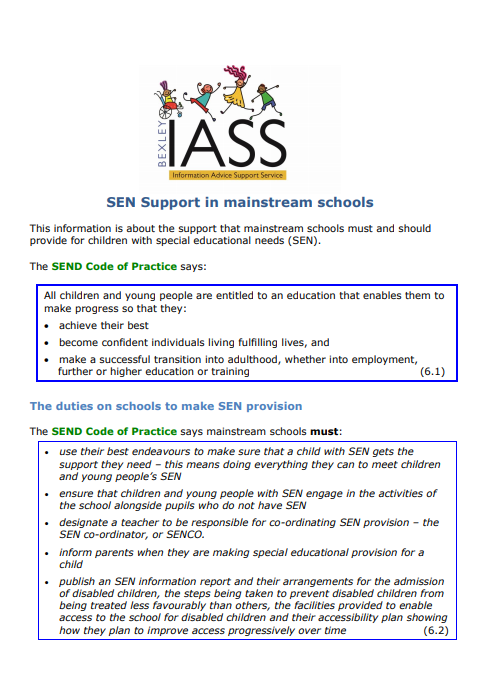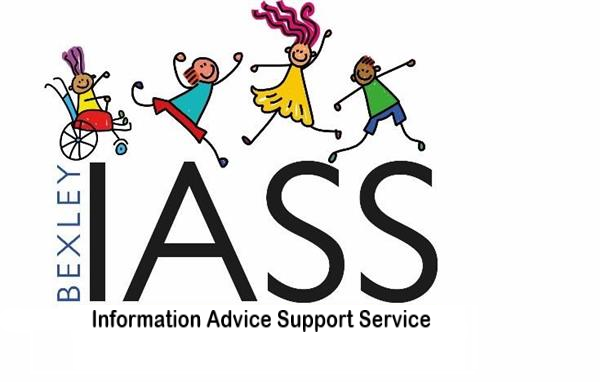SEN Support in Schools
This section provides information and advice about supporting children or young person WITHOUT AN EHCP with special educational needs and disabilities in education.
What is a Special Educational Need?
A ‘Special Educational Need (or SEN)’ means help that is in addition to, or different from the support generally given to all children of the same age.
Teachers make adjustments so that they can meet the wide range of needs for all the children in any given class and this is known as ‘differentiation’.
A school will only recognise a child has a Special Educational Need (or SEN) if they need further adjustments or support on top of ‘differentiation’.
A child does not need a medical diagnosis to be recognised as having SEN.
SEN is not always about a child’s academic attainment. Some children may have other barriers to learning.
These are the four broad areas of need, a full description of each can be found in the SEND Code of Practice 2015:
communication and interaction
cognition and learning
social, emotional and mental health difficulties
sensory and/or physical needs
The SEND Code of Practice 2015 says:
A child or young person has SEN if they have a learning difficulty or disability which calls for special educational provision to be made for him or her. (xiii)
A child of compulsory school age or a young person has a learning difficulty or disability if he or she:
* has a significantly greater difficulty in learning than the majority of others of the same age, or
* has a disability which prevents or hinders him or her from making use of facilities of a kind generally provided for others of the same age in mainstream schools or mainstream post-16 institutions.
What is SEN support?
Schools, nursery schools and colleges should identify pupils who may be having difficulty and decide whether SEN support is appropriate.
A child does not need a medical diagnosis to be recognised as having SEN.
This means Nursery Schools, Schools and Colleges, must use their ‘best endeavours’ to put appropriate support in place.
As a parent / carer you may be the first to notice that your child has special educational needs. If you think your child in nursery or school needs SEN support talk to their class teacher, form tutor or to the Special Educational Needs Coordinator (SENCO). For colleges you will need to talk to student or learning support, this information should be on their website.
SEN Support is provided as part of a graduated cycle of ‘assess, plan, do, review‘.
Bexley IASS have developed SEN Support tools for parents which you will find here:

For more information on SEN Support in schools, Local Authority services and the Bexley Local Authority SEN Toolkits please click here: BEXLEY LOCAL OFFER
Choosing a school for your child with Special Educational Needs
Bexley IASS works at arms-length from the local authority, we offer impartial information, advice and support around Special Educational Needs and Disabilities (SEND).
Due to our impartiality, we cannot offer advice or opinion on the most suitable school for your child.
Education of children outside their chronological year group
If you are considering a request for your child to be placed below (deceleration) or above (acceleration) their chronological age group the following factors must be considered:
- Is the pupil’s development significantly below the expected level for their age range?
- Has the pupil experienced problems which have resulted in being out of education for a substantial period of time?
- Has the pupil previously been educated in a different year group from the normal one for their age up until that point?
- Is the pupil remarkably gifted and talented?
- Was the pupil born prematurely and would they have been admitted into the year ‘below’ if delivered on their due date?
- Is the pupil delayed emotionally and therefore cannot make adequate relationships with their peer group?
When you are making a request for your child to be educated outside of their chronological age group, you will need to have strong evidence.
For children starting a new school:
The decision-maker, in the case of admission to school, will be the Local Authority (LA). However, the LA must also take account of the views of the headteacher of the school concerned.
For children already on roll at the school:
In this case, the person making the decision whether or not to move the child out of their chronological year group, will be the Head Teacher.
What does the Guidance state:
The relevant Guidance to look at here is the School Admissions Code 2021 (P.25).This section states the following:
2.18 Parents may seek a place for their child outside of their normal age group, for example, if the child is gifted and talented or has experienced problems such as ill health.
In addition, the parents of a summer born child may choose not to send that child to school until the September following their fifth birthday and may request that they are admitted out of their normal age group – to reception rather than year 1. Admission authorities must make clear in their admission arrangements the process for requesting admission out of the normal age group.
2.19 Admission authorities must make decisions on the basis of the circumstances of each case and in the best interests of the child concerned.
This will include taking account of the parent’s views; information about the child’s academic, social, and emotional development; where relevant, their medical history and the views of a medical professional; whether they have previously been educated out of their normal age group; and whether they may naturally have fallen into a lower age group if it were not for being born prematurely.
They must also take into account the views of the head teacher of the school concerned. When informing a parent of their decision on the year group the child should be admitted to, the admission authority must set out clearly the reasons for their decision.
2.20 Where an admission authority agrees to a parent’s request for their child to be admitted out of their normal age group and, as a consequence of that decision, the child will be admitted to a relevant age group (i.e. the age group to which pupils are normally admitted to the school) the local authority and admission authority must process the application as part of the main admissions round, unless the parental request is made too late for this to be possible, and on the basis of their determined admission arrangements only, including the application of oversubscription criteria where applicable.
They must not give the application lower priority on the basis that the child is being admitted out of their normal age group. Parents have a statutory right to appeal against the refusal of a place at a school for which they have applied. This right does not apply if they
are offered a place at the school, but it is not in their preferred age group.
Who you can speak to for information and advice:
It can be overwhelming and confusing understanding this process.
If you have any questions regarding SEN Support please contact:
- Bexley IASS at [email protected] or call us on 0203 045 5976.
- Bexley Local Offer at [email protected] or
Tel: 020 3045 5677
